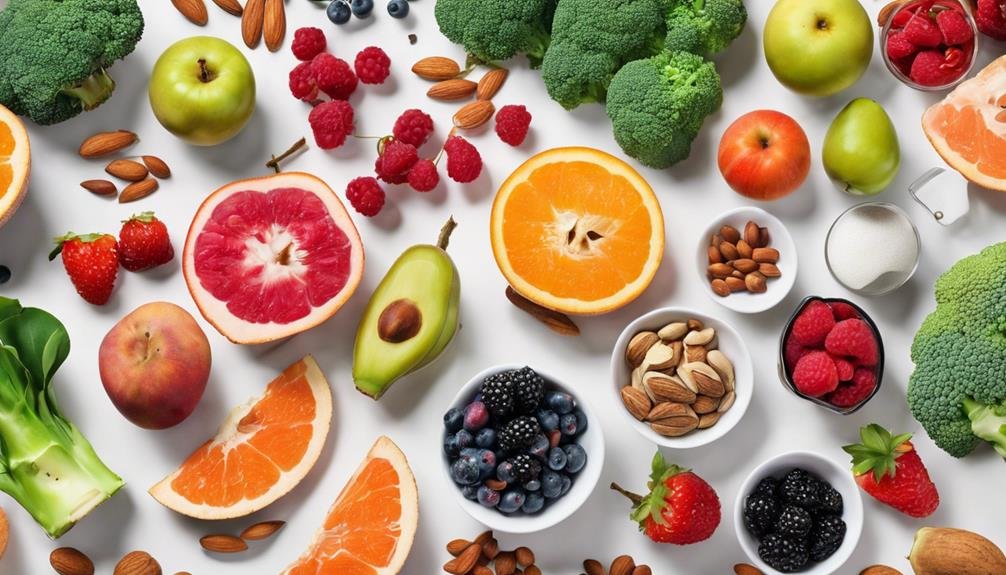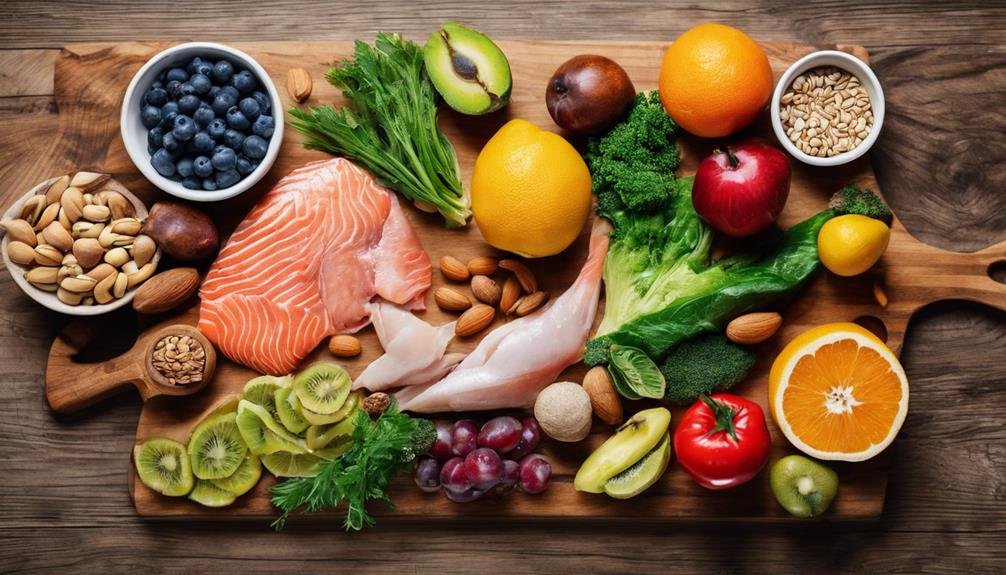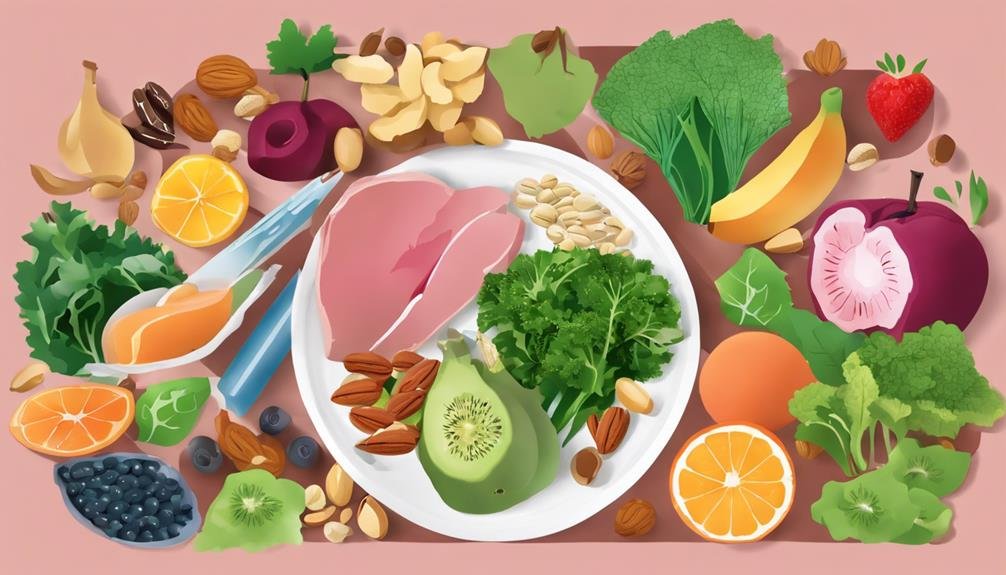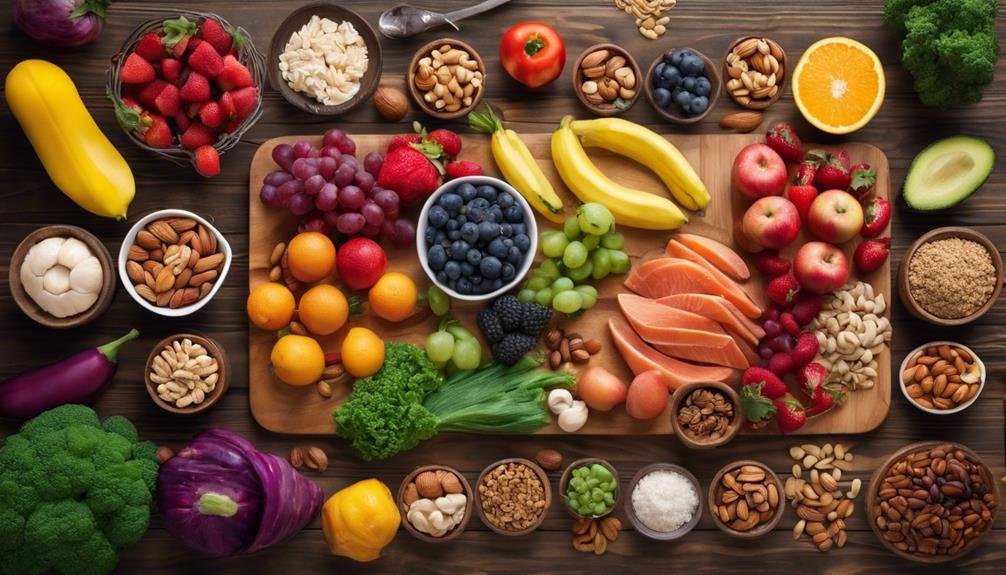When it comes to cancer-fighting foods, incorporating berries into your Paleo Diet can be a powerful step towards supporting your health goals. But did you know there's a whole array of other foods within the Paleo framework that can also offer significant benefits in this arena? From the well-known cruciferous vegetables to the less mainstream bone broth, each item on the list brings a unique set of nutrients and properties that may just surprise you. So, why not explore how these cancer-fighting foods in the Paleo Diet could be a game-changer for your overall well-being?
Berries
When it comes to cancer-fighting foods in the Paleo diet, berries stand out as potent allies in promoting health and well-being. Berries are packed with antioxidants, such as anthocyanins and ellagic acid, which have been shown to combat free radicals in the body, potentially reducing the risk of cancer development. These vibrant fruits also contain high levels of vitamin C, another powerful antioxidant that supports the immune system and helps protect cells from damage.
Studies have suggested that the compounds found in berries may have anti-inflammatory effects, which can be beneficial in preventing chronic inflammation, a known factor in the development of various types of cancer. Additionally, berries are low in calories and high in fiber, making them a nutritious choice for weight management, another crucial aspect in cancer prevention.
Incorporating a variety of berries like strawberries, blueberries, raspberries, and blackberries into your Paleo diet can provide a delicious way to boost your antioxidant intake and support your overall health. Remember to choose organic berries whenever possible to minimize exposure to pesticides and maximize their health benefits.
Cruciferous Vegetables
Rich in cancer-fighting compounds, cruciferous vegetables are an essential component of the Paleo diet. These veggies, including broccoli, cauliflower, Brussels sprouts, and kale, contain sulforaphane, a potent compound known for its anti-cancer properties. Sulforaphane works by helping to eliminate carcinogens from the body and inhibiting the growth of cancer cells.
Studies have shown that regular consumption of cruciferous vegetables is associated with a reduced risk of various types of cancer, including lung, colorectal, breast, and prostate cancer. These vegetables are also rich in antioxidants, vitamins, and minerals that support overall health and strengthen the immune system.
To incorporate more cruciferous vegetables into your Paleo diet, try adding them to stir-fries, salads, or roasting them as a side dish. By including these cancer-fighting veggies in your meals, you aren't only nourishing your body but also taking proactive steps to safeguard your health.
Fatty Fish
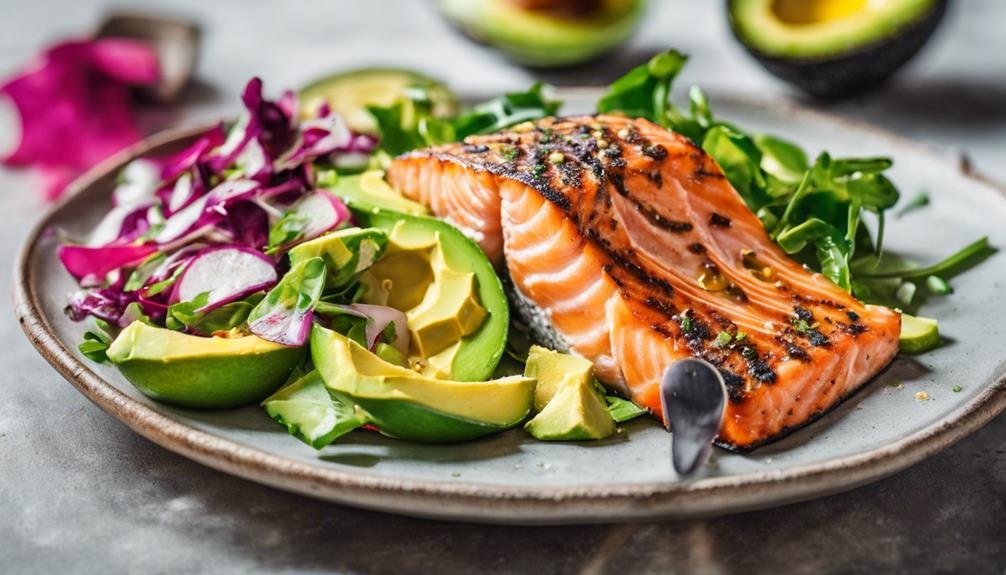
Including fatty fish in your Paleo diet is crucial for reaping numerous health benefits. Fatty fish such as salmon, mackerel, and sardines are rich in omega-3 fatty acids, specifically EPA and DHA, which have been shown to have anti-inflammatory properties that can help in fighting cancer.
Omega-3 fatty acids play a role in reducing inflammation in the body, which is a key factor in the development and progression of cancer.
Moreover, fatty fish is a great source of high-quality protein, essential vitamins like vitamin D, and minerals such as selenium. These nutrients not only support overall health but also aid in cancer prevention. The American Heart Association recommends eating fatty fish at least twice a week to promote heart health, but the benefits extend beyond just cardiovascular well-being.
Incorporating fatty fish into your diet can be as simple as grilling a salmon fillet or adding some canned sardines to a salad. By including these delicious and nutritious options, you're taking a step towards a healthier lifestyle while potentially reducing your risk of cancer.
Turmeric
Incorporating turmeric into your Paleo diet is a wise choice for enhancing your overall health. Turmeric contains a powerful compound called curcumin, which has been extensively studied for its potential health benefits. Curcumin is known for its anti-inflammatory and antioxidant properties, making it a valuable addition to your diet.
Studies suggest that curcumin may help reduce inflammation in the body, which is crucial for fighting cancer and other chronic diseases. Furthermore, curcumin has shown promising anti-cancer effects by inhibiting the growth of cancer cells and reducing tumor growth in various types of cancer.
Adding turmeric to your meals or consuming it as a supplement can help boost your immune system and protect your cells from damage. Its vibrant yellow color not only adds a beautiful hue to your dishes but also serves as a potent health-promoting agent. Start incorporating turmeric into your meals today to reap its numerous health benefits.
Garlic
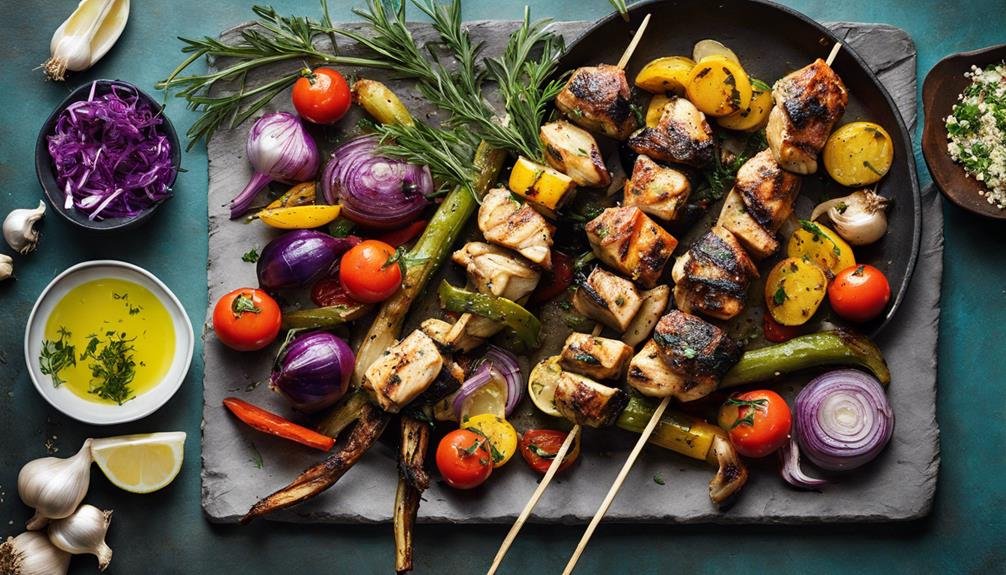
Turmeric's beneficial properties in the Paleo diet have laid a strong foundation for exploring the health benefits of another powerhouse ingredient: garlic. Garlic, a staple in many cuisines, isn't only known for its rich flavor but also for its potential cancer-fighting properties.
This pungent bulb contains sulfur compounds like allicin, which have been linked to anti-inflammatory and antioxidant effects that may help reduce the risk of certain cancers.
Studies suggest that garlic may inhibit the growth of cancer cells and even induce cancer cell death. Allicin, along with other organosulfur compounds in garlic, can help protect cells from damage and reduce inflammation in the body. Incorporating garlic into your Paleo dishes can be a simple yet powerful way to support your overall health and well-being.
To maximize the potential benefits of garlic, it's recommended to crush or chop it and then let it sit for a few minutes before cooking. This allows the beneficial compounds to fully develop. Embrace the flavorful addition of garlic in your meals as a delicious way to potentially boost your body's defense against cancer.
Leafy Greens
Leafy greens are nutritional powerhouses that play a vital role in the Paleo diet. Packed with essential vitamins, minerals, and antioxidants, these vibrant greens offer a myriad of health benefits, including cancer-fighting properties. Spinach, kale, Swiss chard, and arugula are just a few examples of leafy greens that can be easily incorporated into your daily meals.
Studies have shown that leafy greens contain compounds like sulforaphane, indole-3-carbinol, and chlorophyll, which have been linked to reduced cancer risk. Sulforaphane, found in broccoli and kale, has been particularly recognized for its ability to inhibit the growth of cancer cells.
Additionally, the high fiber content in leafy greens supports healthy digestion and may help lower the risk of colon cancer.
To maximize the cancer-fighting benefits of leafy greens in your Paleo diet, aim to include a variety of these nutrient-dense greens in your meals regularly. Whether sautéed, blended into smoothies, or enjoyed in salads, leafy greens are a delicious and powerful addition to your anti-cancer diet.
Nuts and Seeds
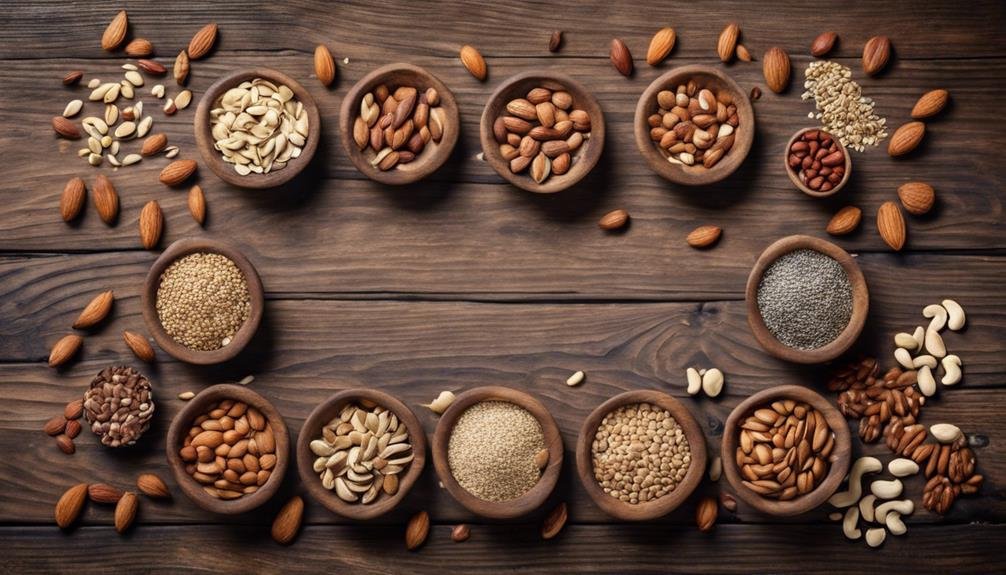
Rich in essential nutrients and heart-healthy fats, nuts and seeds are valuable additions to your cancer-fighting Paleo diet. Nuts like almonds, walnuts, and Brazil nuts are packed with antioxidants, vitamins, and minerals that support your body's natural defense mechanisms against cancer. These nuts also provide healthy fats like omega-3 fatty acids, which have been linked to reduced inflammation and lower cancer risk.
Seeds such as chia seeds, flaxseeds, and pumpkin seeds are rich in fiber, protein, and plant compounds like lignans and phytoestrogens, which have been shown to have anti-cancer properties. Additionally, seeds are excellent sources of minerals like magnesium, zinc, and selenium, which play crucial roles in maintaining a healthy immune system and fighting off cancer cells.
Including a variety of nuts and seeds in your Paleo diet can help you achieve a well-rounded intake of essential nutrients and beneficial compounds that support your body's ability to prevent and combat cancer. So, sprinkle some nuts and seeds on your salads, yogurt, or smoothies to harness their cancer-fighting power.
Mushrooms
Mushrooms, often overlooked but incredibly powerful in their cancer-fighting properties, are a valuable addition to your Paleo diet. These fungi contain bioactive compounds like beta-glucans and lectins that have been shown to have anti-tumor effects. Research suggests that certain mushrooms, such as shiitake, maitake, and reishi, possess immune-boosting properties that can help your body fight off cancer cells.
Shiitake mushrooms, for example, are rich in lentinan, a polysaccharide with potent anti-cancer abilities.
Maitake mushrooms contain a compound called D-fraction, which has shown promise in inhibiting tumor growth.
Reishi mushrooms are known for their high levels of polysaccharides and triterpenes, which have been linked to anti-inflammatory and anti-cancer effects.
Including a variety of mushrooms in your Paleo diet can provide you with a range of cancer-fighting benefits. Whether you sauté them, add them to soups, or enjoy them raw, mushrooms are a delicious and nutritious way to support your overall health and well-being.
Berries
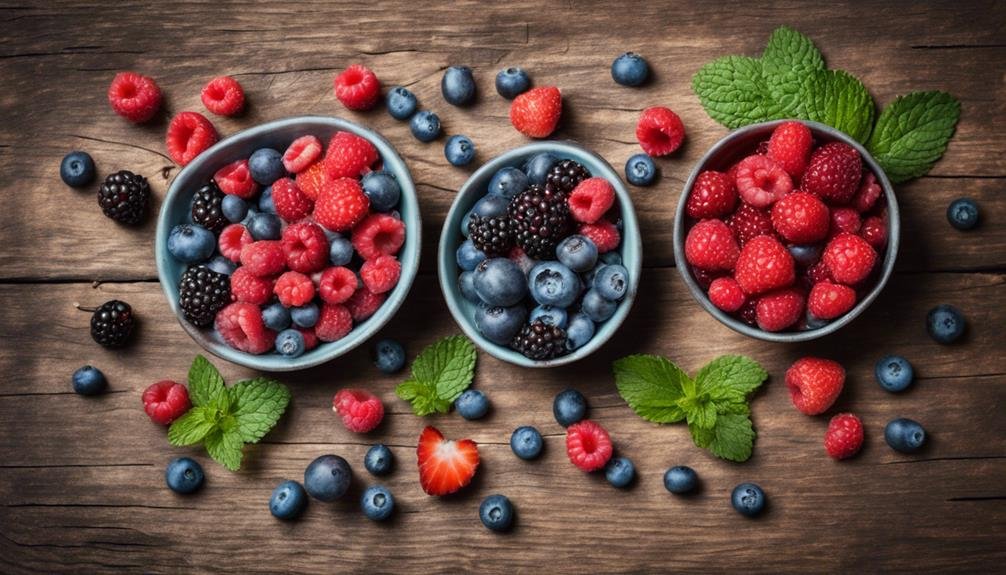
Berries, with their vibrant colors and sweet flavors, aren't just delicious fruits but also potent cancer-fighting allies that can be a valuable addition to your Paleo diet. These little powerhouses are packed with antioxidants, particularly polyphenols, which help protect your cells from damage that can lead to cancer.
Berries like blueberries, strawberries, raspberries, and blackberries contain compounds that have been shown to inhibit the growth of cancer cells and reduce inflammation in the body. For example, ellagic acid found in raspberries and strawberries has been linked to potential anti-cancer effects by preventing the spread of cancer cells.
Additionally, the high fiber content in berries can aid in digestion and promote gut health, which is essential for overall well-being and reducing the risk of certain cancers. Including a variety of colorful berries in your daily meals can be a simple and tasty way to enhance your cancer-fighting efforts while enjoying a delicious treat.
Bone Broth
Boasting a rich history of culinary and medicinal use, bone broth is a nutrient-dense liquid that can be a valuable addition to your Paleo diet. This ancient elixir isn't only comforting but also packed with essential nutrients that promote overall health and well-being.
- Rich in Minerals: Bone broth is a good source of essential minerals like calcium, magnesium, and phosphorus, which are crucial for maintaining strong bones and teeth.
- Gut Health Support: The gelatin in bone broth helps to support gut health by promoting the growth of beneficial bacteria and repairing the gut lining.
- Anti-Inflammatory Properties: The amino acids in bone broth, such as glycine and proline, have anti-inflammatory effects that may help reduce inflammation in the body.
- Immune System Boost: The nutrients in bone broth, like collagen and amino acids, can support a healthy immune system, helping your body fight off infections and diseases.
Citrus Fruits
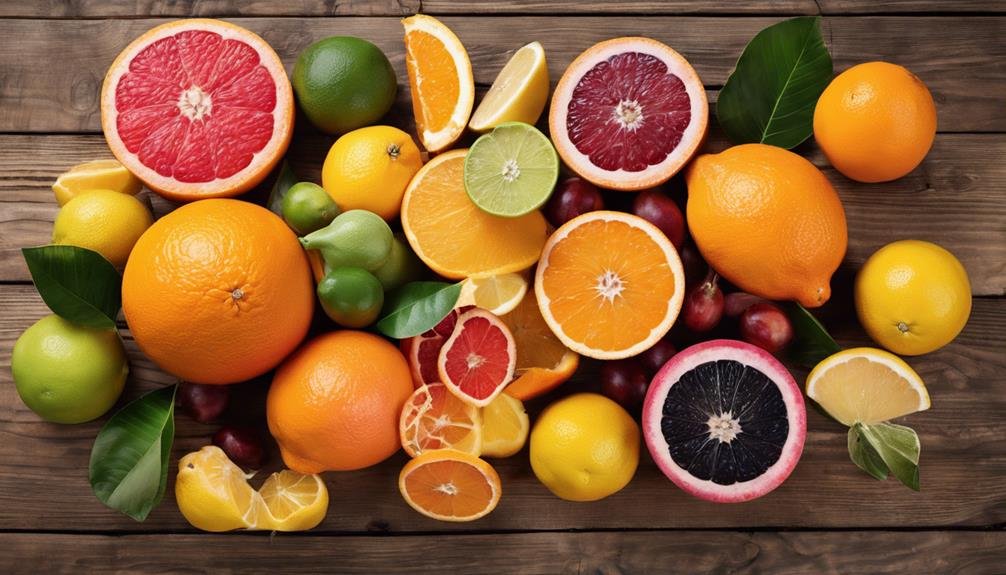
Citrus fruits are a vibrant and refreshing addition to the Paleo diet, offering a burst of flavor and a wealth of nutritional benefits. Oranges, grapefruits, lemons, and limes are packed with vitamin C, a powerful antioxidant that helps protect cells from damage and boosts the immune system. These fruits also contain flavonoids, compounds known for their anti-inflammatory and anti-cancer properties.
Research suggests that the flavonoids found in citrus fruits may help reduce the risk of certain types of cancer, including breast, stomach, and pancreatic cancer. Additionally, the high fiber content in citrus fruits can aid in digestion and promote gut health, which is essential for overall well-being.
Incorporating citrus fruits into your Paleo diet is simple and delicious. You can enjoy them as a snack, add them to salads for a zesty kick, or use their juice to flavor meats and seafood. By including citrus fruits in your meals, you not only enhance the taste but also boost your body's defenses against cancer.
Herbal Teas
With their soothing aroma and diverse health benefits, herbal teas are a delightful addition to the Paleo diet. Herbal teas offer more than just a comforting drink; they can also play a role in cancer prevention and overall well-being.
Here are four reasons why herbal teas are a valuable addition to your anti-cancer diet:
- Antioxidant Power: Many herbal teas, such as green tea and chamomile, are rich in antioxidants that help combat oxidative stress and reduce the risk of cancer development.
- Anti-Inflammatory Properties: Herbal teas like ginger and turmeric have potent anti-inflammatory effects, which can help lower inflammation levels in the body, potentially reducing cancer risk.
- Immune System Support: Certain herbal teas, like echinacea and elderberry, can boost the immune system, enhancing the body's ability to fight off cancerous cells.
- Stress Reduction: Herbal teas like peppermint and lavender can help reduce stress and promote relaxation, which is crucial for maintaining overall health and supporting the body's natural defenses against cancer.
Frequently Asked Questions
Can I Consume Dairy Products While Following the Paleo Diet?
Yes, you can consume dairy products while following the paleo diet, but it's recommended to choose high-quality, organic, and full-fat options.
Some people may be sensitive to dairy, so listen to your body for any adverse reactions. Dairy can provide essential nutrients like calcium and vitamin D, but be mindful of moderation.
Consider incorporating fermented dairy like yogurt or kefir for probiotic benefits that can support gut health.
Are There Any Specific Cooking Methods That Enhance the Cancer-Fighting Properties of These Foods?
To enhance cancer-fighting properties in foods, opt for cooking methods like steaming, sautéing, or roasting instead of deep-frying. These methods help retain the nutrients and antioxidants present in the ingredients.
Additionally, using herbs and spices like turmeric, garlic, and ginger can further boost the anti-cancer effects. By cooking foods gently and incorporating these flavorful additions, you can maximize the health benefits of your meals while following a cancer-fighting diet.
How Can I Incorporate These Cancer-Fighting Foods Into My Daily Meals?
To incorporate cancer-fighting foods into your daily meals, start by adding colorful fruits and vegetables like berries, leafy greens, and cruciferous veggies.
Swap out processed grains for whole grains like quinoa or brown rice.
Choose lean proteins such as fish, poultry, and legumes.
Incorporate healthy fats like avocado, nuts, and seeds.
Experiment with herbs and spices like turmeric, garlic, and ginger for added flavor and potential health benefits.
Can I Still Enjoy Desserts While Following a Cancer-Fighting Paleo Diet?
Yes, you can indulge in delicious desserts while following a cancer-fighting Paleo diet. Opt for treats made with natural sweeteners like honey or maple syrup and use almond flour or coconut flour as a base. Experiment with recipes for Paleo-friendly desserts such as chia seed pudding, coconut macaroons, or avocado chocolate mousse. These alternatives can satisfy your sweet tooth while still aligning with your cancer-fighting dietary goals.
Are There Any Potential Interactions Between These Foods and Cancer Medications?
Absolutely, potential interactions between cancer medications and certain foods exist. It's crucial to be mindful of any adverse effects when combining the two. Some foods may interfere with the absorption or effectiveness of medications, impacting your treatment.
To ensure the best outcomes, always consult your healthcare provider or a registered dietitian for guidance on which foods to avoid or moderate while on cancer medications. Your health is a top priority!
Conclusion
So there you have it – a delicious arsenal of cancer-fighting foods to incorporate into your Paleo Diet. From the vibrant antioxidants of berries to the powerful anti-inflammatory properties of turmeric and garlic, these nutrient-rich options offer a tasty way to support your overall health and potentially reduce your risk of cancer. So grab a fork, fill your plate, and nourish your body with these powerful allies in the fight against cancer.
